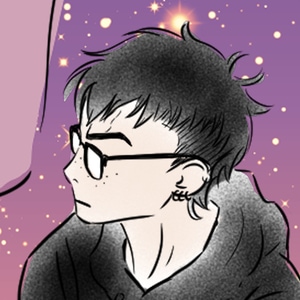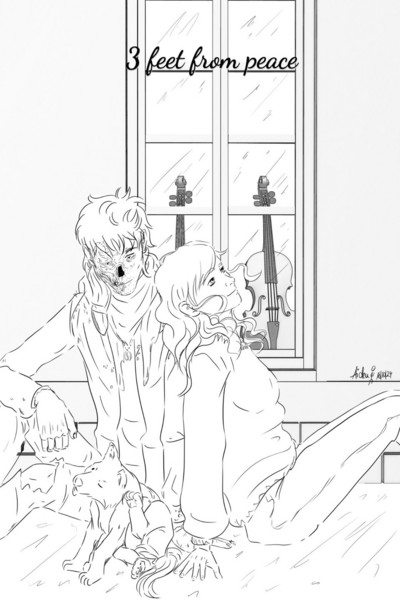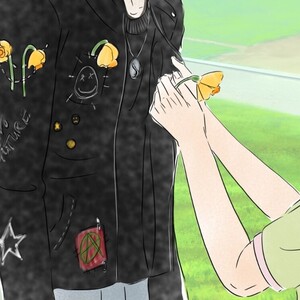Saturday is the busiest day of the week at Paganino. The small shop is overflowing with music enthusiasts, tourists, and students, all of whom are curiously admiring the violins. Christine and Gustave are busy with customers, while Erik mostly stays in the background, taking care of the violins in the workshop. The smell of fresh wood, linseed oil, and coffee fills the air. Christine moves through the room with a fairy-like grace, advising customers and making sure everything runs smoothly. And from time to time, Gustave's deep, hearty laughter echoes from a corner of the store, where he's serving his customers.
Erik stands at the workbench and sets the side cutters aside. He takes the violin in his hands, turns it slightly, grabs the bow, and plays a scale. These aren't the only actions he confidently performs on the violin, but it's enough to roughly check the instrument's condition. The piece by Vivaldi, which he had once tried, has been untouched in the corner for a while now. In recent days, he has skipped his hours with Gustave more often – a good place to sleep has seemed more urgent than music.
Christine sticks her head through the door frame. “Are you almost done?” she asks the punk. “Just finished. It's good again,” Erik murmurs as he checks the strings. “It was just the D-string, but for safety, I replaced all the strings.” He hands the violin to Christine, who nods her thanks. “Very good, thank you,” she says briskly, and Erik turns back to the workbench, satisfied with his work. He feels more and more confident in his craft and notices that he's making progress.
It feels good to be here – to be needed.
The punk stands up, pulls his mask under his chin, walks around the workbench, and opens the small window. Fresh air mixes with the warm scent of linseed oil that fills the room. Sasha, the dog, shifts on the small sofa in the corner of the back room and groans softly. For a brief moment, everything almost feels like a little home.
Music. Craftsmanship. A family...
Erik takes a deep breath and lets his thoughts wander.
What if
I could stay?
What if this shop could actually become my home?
A
place where I am not only be needed but where I truly belong?
A
home I never had.
"Pojke!" Gustave’s voice joins his thoughts, and Erik jumps, quickly closes the window, and pulls his surgical mask back on. He hurries out of the back room, the hustle, and bustle of the shop immediately palpable around him. The old man waves him over from the corner with a mischievous grin on his face.
"Ah, there you are! Come here, Erik, come!" Gustave calls loudly, and Erik scans the customers until he spots the old violin maker with a young woman and an older man in the corner. Sighing, Erik trudges over to them, nods briefly to the customers, and waits for Gustave to introduce him.
"This is Erik, he’ll take a look at your violin and fix it if it’s broken,” Gustave says with a smile that almost hurts Erik. He places his hand proudly on Erik's shoulder, and the young man feels like an actor in a role he doesn’t fully understand. Gustave pats him encouragingly and moves on.
He has an absurd amount of trust in the young homeless man.
“I… I’ll take your violin into the workshop. It won’t take
long,” Erik murmurs quickly, not looking for conversation or even
meeting his customers’ eyes.
There is no welcoming greeting, no
questions about the violin. Just the quick handoff of the instrument.
The older man's gaze is unmistakable. His eyes stick to the
surgical mask. Erik feels it, senses the scrutinizing look, the
judgment. It’s not the first time he’s been subjected to such
gazes.
The young woman hands him the violin case. “How long will
it take?” she asks kindly. “If you want, you can grab a coffee at
Gianni’s next door,” Erik murmurs, without really looking at her.
“About that long…” he adds, almost inaudibly. But the man is already upset. “What do you think you’re doing?” he grumbles, and Erik flinches. “What kind of service is this? You didn’t even ask what the problem is! And then you’re doing nepotism with the neighbor?!” The man turns around angrily and looks for Gustave.
“Dad, just leave it, I wanted to get a coffee anyway…” the young woman calls, but the man doesn’t respond, just stomps off. “Sorry…” Erik murmurs. The words hang heavily in the air, and for a moment, the young man feels like an outsider again. He shakes off his paralysis and heads toward the back room.
“I think it’s great that your boss lets disabled people work here!” the young woman calls after him, and although it’s probably meant kindly, it hits Erik like a blow.
Bad service.
Nepotism.
Disabled.
He squeezes past Christine, followed by Sasha, who happily trots behind him. His breathing is shallow, and he feels like he’s done everything wrong. He’s upset a customer, tarnished Gustave’s reputation. Maybe he’ll never be allowed to work in this shop again.
But then he hears Gustave shout loudly, “The boy is still learning! He’s my best student! He just wanted to make the waiting time more comfortable for you!” Out of the corner of his eye, he sees Gustave arguing with the older man. Then he turns his head, and Christine’s gaze is fixed directly on him. She gives him an encouraging nod before she has to return to the register.
Erik disappears through the doorway, takes a deep breath, and sinks onto the stool in the workshop. The violin he pulled from the case lies before him, and he starts examining it. The strings are in good condition. Erik plays a scale, but the notes sound muted, distant. The violin seems out of tune, the body not quite in harmony.
“Hm... no soul...” he murmurs to himself as he puts the bow down. Thoughtfully, he scratches the back of his head and slowly swivels on the stool. Then, suddenly, he jumps up and leans over the violin.
“It’s not the strings...” he mutters. Carefully, he removes his surgical mask, wipes his mouth with the sleeve, and looks more closely again. Something’s not right, but he can’t quite put his finger on it. The violin is in good condition, no cracks in the wood, but something’s missing.
“This is...” he begins as he carefully picks up the violin. Just then, Gustave enters the room, his grin wide and unmistakable. “Did you find the problem?” he asks, and Erik nods. “It’s not visible,” he says, holding the violin up to Gustave. “It’s something with the sound post.”
“Is that so?” Gustave takes the violin and taps lightly on the wood. “What do you have to do?”
“Remove the strings, use the sound post setter to take it out and check if it’s defective... or if it’s just not seated properly,” Erik murmurs. He feels a little uncertainty in his voice, but Gustave’s smile only grows wider.
“Good, I trust you.” Gustave hands him the violin and adds, “And your customers are back. Talk to them.”
Erik looks at the clock. Over half an hour has passed. He nods, takes the violin, pulls the mask back up, and heads back.
“Oh, Pojke,” Gustave calls after him. Erik stops and turns around.
“You’re really doing well,” says the old man, nodding at him.
And there it is again – that little, uncertain smile that means more to Gustave than he can admit to himself.
...
When Erik enters the salesroom, he feels the curious gazes of the customers on him, but this time, he no longer feels like an intruder. The older man is already back in his place, the young woman by his side. The tension seems to have cooled a bit, and even the stern expression on the man’s face is less harsh.
Erik takes a deep breath and then steps closer to the customers. The young woman gives him a slight smile, and although the older man’s gaze is still scrutinizing, it’s less hostile.
“It’ll take about twenty minutes.” His sentences are short and to the point. No explanation, no attempt to make conversation. Just the information he thinks is necessary. His gaze fixed on the violin in his hands.
“And... what exactly was the problem?” the young woman asks kindly, but Erik avoids meeting her gaze.
“The sound post,” he murmurs, as his fingers nervously play with the violin. “It wasn’t right... it wasn’t seated properly.”
“Alright, then...” begins the older man, but Erik is already lost in his thoughts, halfway out of the room.
He turns to head back to the workshop, feeling the uncertainty weighing on his chest like a heavy burden.
“Okay, thank you,” the young woman finally says, and Erik feels her eyes on his back, but he doesn’t say anything more. It’s the same pressure that always accompanies him when dealing with others – the feeling of not knowing how to behave, how to strike the right tone. Always that discomfort, that sense of alienation.
Gustave and Christine observe the awkward conversation from afar, while Erik silently retreats. Gustave crosses his arms and glances at Christine, who wears an expression of mixed concern and patience.
“Why is he always so uptight?” Christine asks quietly.
“Don’t know, min Älskling,” he answers gently, turning to her. “He didn’t grow up in retail like you. You learn quickly how to handle people. ”
“But he acts like he’s going to get slapped any minute...” murmurs Christine, her eyes following Erik as he enters the workshop again.
Gustave sighs and nods slowly. “I know. But he’s good. Do you know that? He’s good at what he does. With his hands, I mean.”
The workshop is quieter, separated from the glances and expectations outside. Sasha turns on the sofa, looking at him with half-open eyes. He gently strokes her head, her warmth comforting him.











Comments (0)
See all